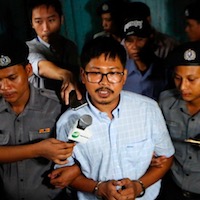News
Officer in Reuters case broke police code - lawyer
Monday 18 June 2018

A police witness in the case against two Reuters reporters accused of possessing state secrets in Myanmar is "unreliable," the reporters' lawyer said on Monday, because he obtained testimony from previous witnesses, in violation of police code.
Prosecution witness Police Major Tin Win Maung, a senior officer involved in the inquiry into the journalists, told the court he had applied for copies of statements made by all other witnesses.
The court in Yangon is set to hear arguments from both sides on 2 July on whether Wa Lone (photo), 32, and his Reuters colleague Kyaw Soe Oo, 28, will be charged under the colonial-era Official Secrets Act, which carries a maximum penalty of 14 years in prison.
The pre-trial hearings, which have been going on since January, drew to a close on Monday as the prosecution presented its last witness.
During cross-examination, Tin Win Maung said he had copied the statements because “he wanted to know more about the case” as an investigating officer.
Defence lawyer Khin Maung Zaw said the police officer’s actions were not illegal but violated a clause from the Burma Police Manual, a set of rules governing police behaviour.
“He is not reliable because he has breached those police regulations,” the lawyer told Reuters after the proceedings.
“The would-be witness must not know what the previous witness has testified because he will prepare himself according to the statements of the previous witnesses,” he said.
The code says when an officer is a witness in a case, “he will not be present in the court while the inquiry or trial is proceeding”, otherwise the magistrate may object to his evidence “on the ground that he has heard all that the other witnesses have said, and will naturally adapt the details of his narrative to theirs”.
At the time of their arrest in December, the reporters had been working on an investigation into the killing of 10 Rohingya Muslim men and boys in a village in western Myanmar’s Rakhine State. The killings took place during a military crackdown that UN agencies say sent nearly 700,000 people fleeing to Bangladesh.
The reporters have told relatives they were arrested almost immediately after being handed some rolled up papers at a restaurant in northern Yangon by two policemen they had not met before, having been invited to meet the officers for dinner.
On Monday, defence lawyers said the prosecution had failed to establish how the alleged documents had come into the reporters’ possession.
“In the law, in the Official Secrets Act, it is said that these documents, those official secret documents, must be obtained,” Khin Maung Zaw said. “They cannot prove that they were obtained.”
Speaking to reporters after the hearing, Wa Lone said he was hopeful that “fortunate things” might happen at the next hearing.
“I completely believe the truth will come out,” he said. ■
- SOURCE
- Reuters
- « Previous
- Next »
- 566 of 2177